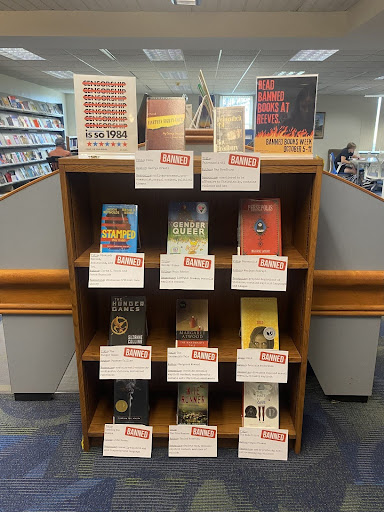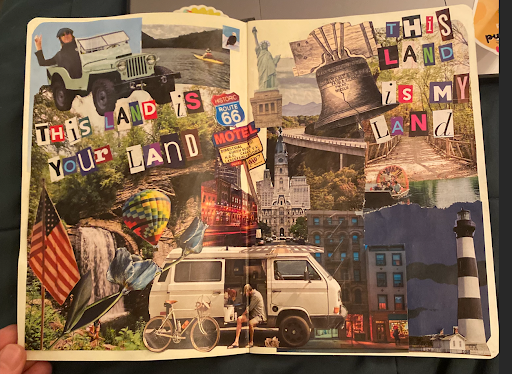Throughout this semester, we studied four different authors: Plato’s “Apology” and “Crito,” Niccolo Machiavelli’s “The Prince,” John Locke’s “The Second Treatise of Government,” and James Baldwin’s “The Fire Next Time.” Our class wanted to share with the rest of the school. We took this course in a time of war, political conflict, fear, and anxiety. Studying theory helps you think more philosophically about consciousness and action, get more perspective on a moment of political chaos, and opens up more nuanced accounts than statistics and news headlines.
Individual Ideals to Community Connections
Danielle Tessarvich
Thought matters more than one might think. Communities need to recognize the importance of thought or consciousness. What you think influences how you talk, what you do, what you say, etc. It is important to self-evaluate and think about your beliefs. As a reader, you can be transformed in terms of your thinking and can, in turn, transform your reality. Understanding other people’s beliefs and how their thoughts influence them can help you understand how well you both can engage with one another. Context matters.
Jay Daniels
To incite change and evolution as a society, we must not only cling to individual ideals and philosophies, but to shared purpose and mutual trust. Within the tapestry of change, every stitch is a vital part of a woven picture. It takes a village, and community is the heart of it.
From Theory to the World
Jesús Rivera Ureña
Try to connect what you learn in class to the outside world. Linking the philosophies of the texts with real-life events or people will help you remember them better. A good example is using Niccolo Machiavelli’s “The Prince” to make sense of the actions of political leaders, or using John Locke’s “Second Treatise of Government” to understand why different types of protests are legitimate.
Jared Brooke
Reading different theories is like considering different perspectives: you get different pieces of the puzzle. Also, politics is not just about recognizing different political ideas, but also knowing the right course of action to take. Both thought and action matter equally. (Niccolò Machiavelli, “The Prince”).
Nicole M. Polanco Berroa
More people need to know about the right to legitimate rebellion. How do we know when the social contract is broken and when we should take action? Also, the economy of emotion is useful for thinking about how to interact with others. How do we get respect? Might we be too nice? Are we giving too much?
(John Locke, “Second Treatise of Government;” Niccolo Machiavelli, “The Prince”)
Sydnie Stanton
The unexamined opinions that led to the accusation and conviction of Socrates (Plato, “The Apology”) share a strong connection with what James Baldwin (“The Fire Next Time”) calls a person’s “systems of reality,” being stuck in a mindset divorced from the self, others, and history. Together, a person’s unexamined opinion and incapability of reflecting on their system of reality restrict the community from progressing and connecting. Empathize!
On the Importance and Experience of Thought
Britney Udeh
It’s very important to know why people think a certain way. We can’t be too quick to react to what someone has to say. Take time and think about the background of the other person.
Ryan Rissmiller
Stop and think. Timing matters. Be sensitive about when you ask and when you respond. Consider the experiences of the other person. This will help make better connections with the other person.
Paul Lopez
The world revolves around human nature claims. Laws and governments have to work with human challenges. Some authors view humans in a very static and general way. Other authors think about what shapes our consciousness and what could change in the future.
Wiktoria Dalomis
Accepting differences is important. It’s something to think about before speaking and acting. It is also important to take our differences as learning experiences to allow us to have a more open mind when it comes to forming opinions. Differences don’t serve as barriers, but as opportunities for growth.
Rafael Sanjuan
When approaching political theory, it’s okay to begin with pre-political assumptions. These starting points aren’t limitations but rather foundations from which you can engage critically with theoretical texts.
How to Have Better Conversations
Jessica Dutan
We shouldn’t be quick to accept any statement as fact. We need to question and converse before we accept anything immediately. This makes us less susceptible to misinformation and allows us to understand events more deeply.
Moira McCarron
We have so many personal values and beliefs that shape our political opinions. It’s important to know yourself in terms of how you think and what you bring to have more productive political conversations. Sometimes, we think we find a part of ourselves in a political representative and thus connect with or support that person; unfortunately, this leads to people making uninformed decisions. This past election brought to light many opinions, positions, and countless arguments. These issues are modern, and they matter. 2025 is a pivotal year for the United States Government; much has to change.
Elise Hennebery
Different authors have different projects. It’s okay to disagree, but try to understand the intention of the author and the value of the project with respect to that intention. Practice “good faith” reading of texts, starting from the belief that the author has a worthwhile intention.
Jake Dillinger
The big lesson is listening. Listening to the opinions of others is important. Sometimes listening is more important because you need to take a moment to consider how you might revise your own thoughts.





![The Downfall of Taylor Swift: AI, ‘The Life [and Demise] of a Showgirl’](https://comenian.org/wp-content/uploads/2025/10/unnamed-6-1.jpg)


